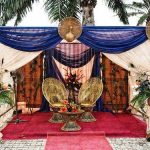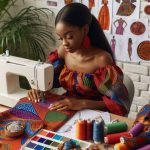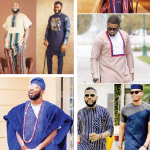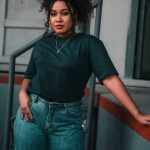When it comes to Nigerian weddings, they are more than just a celebration of love; they are a showcase of our rich culture, deep traditions, and the flamboyant sense of style we Nigerians are known for. Whether you’re getting married in Lagos, Port Harcourt, Abuja, or in a village where cultural roots run deep, your look is not complete without the right accessories. In fact, accessories are what transform your wedding attire from basic to regal. They add that touch of elegance, sophistication, and authenticity that every Nigerian bride or groom needs to make a statement on their big day.
Now, this guide is for you whether you’re a bride, groom, or even a guest. Nigerian weddings come with a unique sense of identity, from traditional to contemporary styles, and it is important to choose the right accessories to reflect that. This post will give you insights into what accessories to wear, how to wear them, and why they’re important for your Nigerian wedding. Grab a seat, as this is going to be a deep dive into the world of Nigerian wedding accessories.
1. Headpieces and Gele: Crown Yourself the Queen or King
No Nigerian wedding is complete without a fabulous headpiece. For the bride, it’s all about the Gele—a traditional headwrap that is not only a statement piece but also a symbol of pride and femininity. Gele can be tied in different styles depending on the region and the bride’s preference. Whether you’re going for the dramatic, towering style or a more subtle wrap, the gele is essential for any traditional Nigerian wedding outfit.
For brides looking for an extra wow factor, there are modernized versions of gele made with fabrics like aso-oke, damask, and silk. If you want to add some bling, you can opt for embellished or beaded gele, which has become a huge trend in recent years. But gele isn’t just for brides—mothers, aunties, and guests all adorn gele in different ways to celebrate the occasion.
For grooms, while gele may not be the go-to, a traditional Fila or Cap—especially in Yoruba and Hausa cultures—is essential. The cap speaks volumes about the groom’s style and complements his agbada or babariga. Like the gele, fila styles vary depending on your tribe and the statement you want to make.
Tips for Choosing the Right Gele:
- Choose a color that complements your outfit.
- Don’t be afraid to go for a bold style, especially if your wedding is a traditional one.
- Get a professional gele stylist. Trust me, gele-tying is an art. You don’t want to mess up your big day trying to DIY it.
2. Jewelry: The Bigger, The Better
When it comes to Nigerian weddings, jewelry is a non-negotiable. It symbolizes wealth, status, and tradition, especially for brides. The more elaborate your jewelry, the more regal you look. Traditional Nigerian bridal jewelry is often made from coral beads, gold, or even diamonds depending on your style and budget.
Coral Beads: For brides from the south, particularly among the Edo, Igbo, and Yoruba people, coral beads are a must-have. These aren’t your ordinary jewelry pieces; these are large, regal beads that sit beautifully on your neck, ears, and wrists. Coral beads are also a symbol of royalty and are often passed down through generations.
Gold Jewelry: For a more modern touch, gold jewelry is a great choice. Gold necklaces, bangles, and earrings can be worn to complement your wedding dress or traditional attire. In Hausa and Yoruba culture, gold jewelry is especially important and reflects the bride’s family’s wealth and heritage.
Statement Necklaces: Even if you’re not into traditional coral or gold, a bold statement necklace is a fantastic way to accessorize a more contemporary wedding look. Beads, stones, or even pearls can be incorporated to elevate your style.
Tips for Choosing Wedding Jewelry:
- Go big but don’t overdo it. There’s a fine line between looking regal and looking over-accessorized.
- Stick to one type of metal or bead for consistency—don’t mix gold and silver, for example.
- Match your jewelry to your attire. If you’re wearing a lot of intricate designs, keep the jewelry simple and elegant.
3. Fans and Handbags: The Ultimate Nigerian Bridal Accessory
One of the most iconic accessories that Nigerian brides carry is the bridal fan. While fans have been used for centuries in traditional African ceremonies, they’ve now become a staple for Nigerian weddings. These aren’t just any fans; they are intricately designed with feathers, pearls, and sometimes even gold embellishments to match the bride’s outfit.
A fan serves both functional and aesthetic purposes. Besides keeping the bride cool during the ceremony, it adds an element of grace and sophistication. In Yoruba weddings especially, brides are often seen posing with their fans, and it has become almost as important as the bouquet in western weddings.
Handbags, on the other hand, are a more modern addition to the Nigerian bridal look. These are often small, clutch-sized bags adorned with crystals, beads, or sequins. The key is to choose a handbag that complements your dress without drawing attention away from your overall look.
Tips for Picking a Fan or Handbag:
- For a fan, match it with the fabric of your wedding attire—whether it’s lace, aso-ebi, or gele material.
- Opt for a smaller, elegant clutch that can hold just the essentials.
- Choose accessories that align with the overall color scheme of your wedding.
4. Shoes: The Perfect Pair for Your Traditional and White Wedding
Nigerian weddings are typically divided into two parts: the traditional ceremony and the “white” or church wedding. Both require different types of shoes. For the traditional ceremony, you might opt for embellished slippers or sandals that match your iro and buba, gele, or agbada.
For the white wedding, Nigerian brides love to go all out with designer heels or custom-made shoes that feature crystals, beads, or even personalized engravings. Grooms also need to pay attention to their footwear. The right pair of leather shoes, loafers, or even traditional sandals can make or break a groom’s look.
Tips for Choosing Shoes:
- Comfort is key! You’ll be standing, dancing, and moving around for hours.
- Make sure your shoes match not just your outfit but also the tone of the event. Don’t wear casual sandals to a white wedding.
- Consider bringing a change of shoes for the reception. Many Nigerian brides swap their heels for more comfortable options after the main ceremony.
5. Waist Beads and Anklets: Subtle yet Sexy
Though they may not be visible to everyone, waist beads and anklets are popular accessories for brides in Nigeria. Waist beads have been used for centuries as symbols of femininity, sensuality, and fertility in many Nigerian cultures. For some, waist beads are worn underneath their wedding attire as a secret and intimate accessory.
Anklets, on the other hand, are making a strong comeback in Nigerian wedding fashion. Brides, particularly those wearing shorter dresses or those with side slits, are incorporating delicate anklets made of gold, silver, or beads to add a touch of allure to their look.
Tips for Wearing Waist Beads and Anklets:
- Choose waist beads in colors that have personal significance, or simply match them to your wedding theme.
- For anklets, go for something subtle and elegant, especially if your dress will showcase your legs.
- Make sure both accessories are comfortable and secure to avoid any wardrobe mishaps during the ceremony.
6. Veils and Capes: The Modern Bride’s Drama Piece
The concept of wedding veils has been reimagined in Nigerian weddings, and many brides are incorporating traditional elements into their veils. Veils adorned with lace, beads, and even pearls add a Nigerian touch to a western wedding tradition. Some brides are also opting for capes instead of veils—these dramatic pieces are fast becoming a trend in Nigerian weddings. Capes can be attached to the wedding dress or worn as a separate piece, creating an aura of regality and elegance.
For traditional weddings, veils or head coverings can also be styled to blend with the gele or even the beaded crowns worn by brides in Edo or Igbo traditional ceremonies.
Tips for Choosing a Veil or Cape:
- Match your veil or cape to your dress, considering the fabric, style, and embellishments.
- Capes can be a more modern and bold choice, while veils give a more traditional and romantic vibe.
- Ensure the veil or cape doesn’t overshadow the rest of your outfit but enhances your overall look.
7. Men’s Accessories: The Groom Deserves Some Shine Too
While much attention is often given to the bride, Nigerian grooms have their own unique set of accessories to complete their wedding look. The Agbada is not complete without a matching cap (fila) and traditional beads. Grooms also often wear ivory staffs or walking sticks as a symbol of their authority and manhood.
In Yoruba culture, grooms also wear large traditional beads (often made from coral or precious stones) around their necks, which are sometimes passed down through generations. The Igbo groom often carries an ofor (traditional staff) symbolizing authority and lineage.
For modern weddings, Nigerian grooms are increasingly wearing cufflinks, pocket squares, and wristwatches to complement their suits. These subtle accessories can make all the difference in elevating the groom’s style.
Tips for Grooms:
- Choose traditional accessories that have meaning in your culture.
- Pay attention to the details—your watch, cuff links, and even shoes can either elevate or ruin your look. Choose wisely.
- Coordinate your accessories with your bride’s look. You don’t have to be matchy-matchy, but there should be a cohesive theme.
- Don’t be afraid to mix tradition with modern touches. A blend of both will make you stand out as a stylish Nigerian groom.
8. Aso-Oke and Wrapper Accessories: The Heart of Yoruba Weddings
In Yoruba traditional weddings, Aso-Oke is one of the most important aspects of the bride and groom’s attire. Aso-Oke is a handwoven fabric traditionally worn by Yoruba royalty, but today, it has evolved into a must-have for any Yoruba bride. This intricate material comes in various colors and patterns, representing wealth, status, and cultural pride.
To take your Aso-Oke to the next level, it’s common to pair it with accessories like matching beads, shoes, and even clutches. The Yoruba bride often completes her look with layers of traditional beads, a fan, and carefully chosen jewelry that accentuates her royal outfit.
For the groom, the traditional Agbada made from Aso-Oke material is a symbol of power and status. The groom also wears traditional beads and a cap to complement the agbada. The secret is to select an Aso-Oke fabric that not only speaks to your heritage but also blends seamlessly with your overall wedding theme.
Tips for Rocking Aso-Oke:
- Choose colors that not only represent you but also resonate with your family and the traditions of the Yoruba people.
- Go for high-quality Aso-Oke fabric, as it will photograph better and give you that regal look.
- Don’t forget to accessorize with beads, brooches, and even gold chains for a more luxurious appearance.
9. Embellished Shawls and Iborun: For the Final Flourish
Another accessory that makes a Nigerian wedding look complete is the Iborun or shawl. In Yoruba culture, brides often wear this over their shoulders as a symbol of grace and elegance. The Iborun is usually made from the same Aso-Oke or lace material as the bride’s outfit and can be heavily embellished with sequins, beads, or embroidery.
For brides looking to make a statement, a richly adorned shawl or Iborun can add that extra layer of glamour. It can be draped elegantly over the shoulders or held in one hand for a chic, sophisticated look. Some brides choose to ditch the traditional veil altogether in favor of an Iborun, and it’s easy to see why—it adds a royal touch that sets you apart.
Tips for Styling the Iborun:
- Ensure that your Iborun complements the color and texture of your outfit.
- Choose a length that’s easy to handle; you don’t want to be struggling with it while dancing or walking.
- Opt for embellishments that won’t overpower your outfit, but instead, add a subtle shine.
10. The Symbolism of Tying the Knot: Bridal Sashes and Belts
In certain Nigerian traditions, the act of tying the knot is more than just symbolic—it’s a physical act performed with special sashes or belts during the traditional ceremony. These sashes are often made from fabrics like Aso-Oke, lace, or damask and are tied around the bride and groom as a symbol of their union.
Though simple, these belts or sashes carry deep cultural significance. Some couples choose to personalize them with embroidery, family crests, or meaningful symbols, adding a special touch to their wedding attire.
Tips for Incorporating Sashes:
- Personalize it! Add an embroidery of your family name, date, or even a special quote.
- Match the sash with the main colors of your wedding outfit for a cohesive look.
- If the sash is part of your traditional ceremony, make sure it’s sturdy and comfortable.
11. Accessories for Wedding Guests: Stealing the Show, the Right Way
Let’s not forget the Aso-Ebi crew—the wedding party or guests who coordinate their outfits to support the bride and groom. Nigerian weddings are famous for their Aso-Ebi culture, where friends and family wear the same fabric in different styles, showing unity and support. Accessories play a big role here too.
For Aso-Ebi wearers, it’s important to choose accessories that complement the fabric while ensuring that the bride and groom remain the center of attention. From matching gele to carefully selected jewelry and shoes, guests often go all out to make sure they look their best.
Tips for Aso-Ebi Accessorizing:
- Respect the couple’s chosen color scheme and fabric; don’t try to outshine the bride or groom.
- Choose accessories that are stylish but not too flashy. You don’t want to overshadow the main couple.
- Pay attention to your headwrap or gele. A well-tied gele can take your outfit from simple to stunning.
Conclusion
In Nigeria, weddings are more than just a union between two people—they are a celebration of culture, tradition, and style. Whether you’re opting for a traditional wedding ceremony or a more contemporary celebration, your accessories are what will elevate your look and make it truly special. From the elaborate gele and statement jewelry to regal fans and personalized sashes, every piece you choose tells a story and adds to the grandeur of the occasion.
Remember, accessorizing is all about balance. Choose pieces that reflect your personality, complement your outfit, and enhance your overall look without overwhelming it. Whether you’re a bride, groom, or guest, the right accessories will ensure you stand out in a sea of celebration.
So, as you plan your Nigerian wedding or prepare to attend one, take your time to select accessories that will not only complete your look but also make you feel like royalty. Because in Nigerian weddings, it’s not just about tying the knot—it’s about looking and feeling your absolute best.
By the time you walk down the aisle, whether in a grand church or a traditional village square, with your head held high and your accessories gleaming in the sunlight, you’ll know you’re not just wearing a wedding outfit—you’re wearing a piece of your culture, history, and identity. And in true Nigerian fashion, you’ll be ready to slay the day.







Leave a Reply